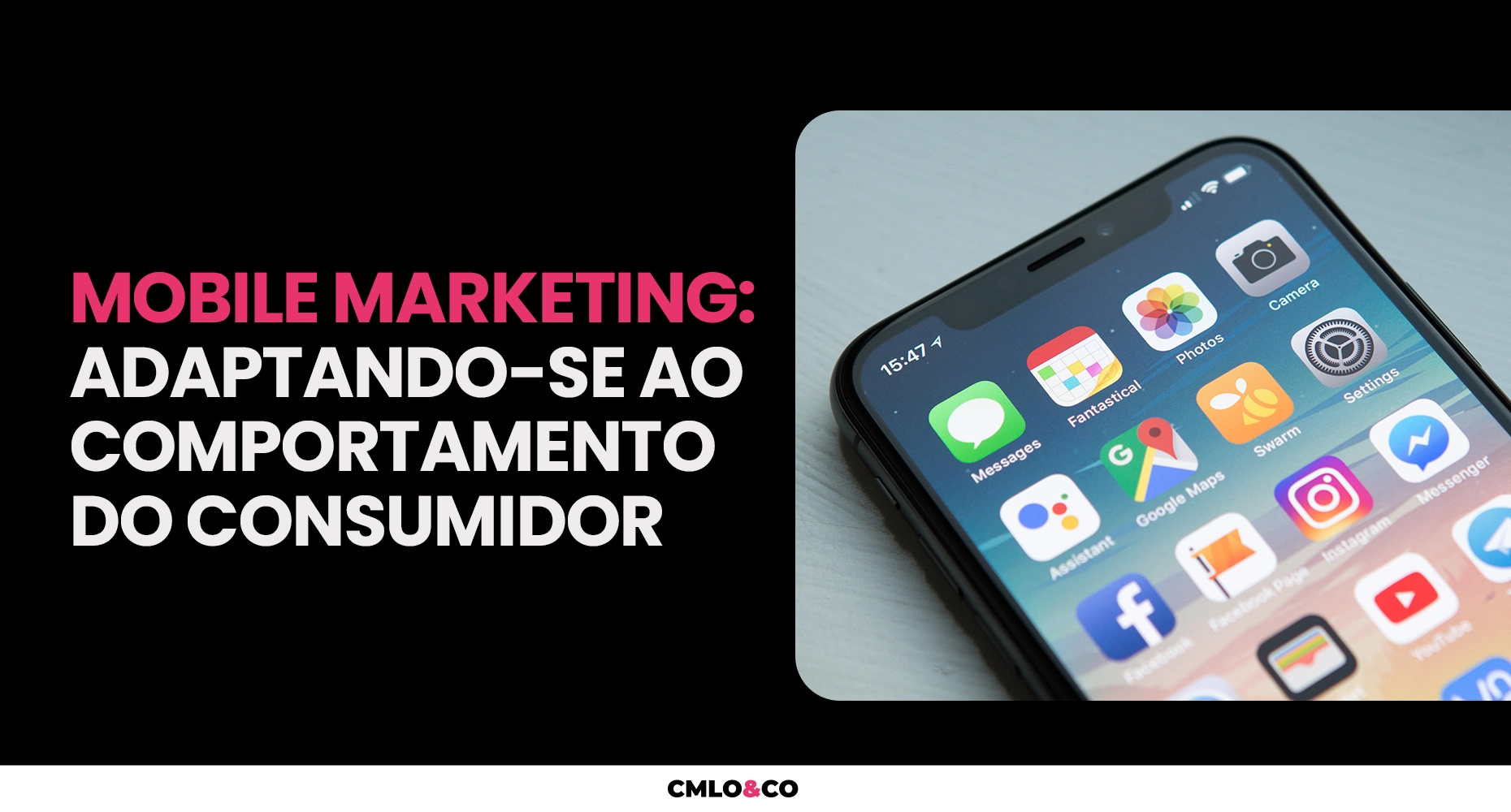Have you ever stopped to think about how many times you use your cell phone a day? Whether for communication, information, entertainment or shopping, the fact is that the mobile devices have become an essential part of our routine. And this is no different for your customers.

The mobile marketing is the marketing strategy which aims to take advantage of the opportunities and benefits of mobile devices to connect with the target audience, offer personalized solutions and generate more sales.
In this article, you'll learn about this strategy and its impact on consumers' purchasing decisions. Are you ready?
What is mobile marketing?
First of all, it's the set of marketing actions that are planned and executed with a focus on mobile devices as communication channels, such as smartphones and tablets, for example.
The aim of mobile marketing is to offer a personalized, relevant and satisfying experience for the user, taking into account the characteristics and limitations of these devices. And, of course, the preferences and habits of each consumer.
How did it come about?
Mobile marketing emerged with the advent and development of mobile devices, which allowed people to access online content and services at any time and place. This also gave rise to a new way of relating to consumers, who now have more autonomy, power of choice and demand.
To give you an idea, the first SMS was sent in 1992in England by a telephone company. Since then, mobile marketing has evolved along with technology and new forms of interaction between people and brands.
The importance of adapting to consumer behavior
Consumer behavior has changed a lot in recent years, mainly due to the influence of mobile devices. Today, consumers are more demanding, informed, connected, multitasking and immediate.
In other words, they want quick, practical and personalized solutions to their problems and desires. They also want to have an active voice in relations with brands, being able to give their opinion, evaluate and share their experiences.
That's why companies need to adapt to consumer behavior and offer more dynamic, interactive and integrated communication across different digital channels. Mobile marketing is one way of doing this, as it allows brands to be present in consumers' daily lives, creating a closer and longer-lasting relationship.
It is therefore essential that companies adapt to this new reality and invest in marketing for mobile devices. Otherwise, they risk losing ground to the competition and falling behind in the market.
Impact of mobile marketing on purchasing decisions
Mobile marketing has a major impact on consumers' purchasing decisions. This is because mobile devices are used at every stage of the buying journey, from research to post-purchase evaluation.
And contrary to popular belief, the strategy doesn't just influence online shopping. On the contrary! Mobile devices also influence offline purchases, as consumers often use their cell phones to compare prices, search for information or opinions on products or services before visiting a physical store.
According to a Google search, 76% consumers who do a local search on their cell phone visit a physical store within 24 hours. And 28% of these searches result in a purchase.
Therefore, this can be an excellent strategy to help your company increase traffic, conversion and customer loyalty.

Top mobile marketing strategies to put into practice
There are various actions that brands can use to communicate with their audiences. We'll explain each one in detail below:
Social networks
Social networks are very popular digital platforms among mobile users. It is therefore important that you create professional profiles on the social networks most suited to your target audience and publish relevant, interactive and attractive content to engage your followers with your brand.
In addition, you can use social media to publicize your company's promotions, launches, events and other news. Currently, the most popular social networks are Facebook, Instagram, Twitter, YouTube, TikTok and LinkedIn.
Responsive websites
The responsive websites are those that adapt to the size and resolution of the screen of the device used by the user. This ensures better navigation, usability and readability of the site.
Responsive websites are essential for brands to be found by consumers on search engines such as Google. And also so that they can access information about the brand's products or services in a simple and efficient way.
Instant messaging
Instant messages are those sent via applications such as WhatsApp, Telegram, SMS or Messenger. They are extremely important for mobile marketing, as they allow quick, direct and personalized communication with the customer.
You can use instant messaging to send reminders, confirmations, notices, offers, support or tips to the customer. But remember to ask the customer's permission before sending any message and to respect the appropriate frequency and timing.
Applications
These are programs that can be installed on mobile devices and offer specific functionalities for users.
Apps can be of various types, such as games, entertainment, education, health, finance, transportation, delivery and others.
You can use applications to offer practical and personalized solutions to your customers, as well as collecting data on their behavior and preferences.
Digital platforms
Digital platforms are websites or applications that bring together various contents or services on a particular topic or segment. The aim is to connect users with brands, offering services or products in an integrated and convenient way.
For example, Spotify is a digital music platform, while Netflix is a digital movie and series platform. In addition to these two, there are several others that can be used for different purposes.
You can, for example, use digital platforms to promote your brand, products or services. But you can also use them to generate traffic, leads or sales, to create partnerships or sponsorships, among other strategies.
Mobile marketing and the user experience
Mobile marketing improves the user experience by offering communication that is more suited to their needs, expectations and preferences. Mobile marketing allows the user:
- Receive relevant and personalized content according to your profile, location and behavior;
- Access information about the brands' products or services quickly and easily;
- Shop simply and securely without leaving your mobile device;
- Interact with brands in a dynamic and interactive way, giving feedback, asking questions and sharing experiences;
- Feel valued and recognized by the brands, receiving exclusive offers, benefits and rewards.
Why invest in mobile marketing?
Undeniably, investing in mobile marketing is a smart and strategic decision for your business. Here are some of the advantages and benefits this strategy can bring to your company:
- Expand your brand's reach and visibility;
- Increase traffic to the company's website or blog;
- Keeping up with market trends and changes;
- Attract and retain more customers;
- Generate more sales and revenue;
- Reduce costs and optimize resources;
- Improve the image and reputation of your brand;
- Differentiate yourself from the competition;
- Measure and analyze the results of your campaigns with precision.
As you've seen in this article, mobile marketing is an essential strategy for adapting to consumer behavior and standing out in the market. It allows you to offer a personalized, relevant and satisfying user experience, increasing customer trust, satisfaction and loyalty to your brand.
And if you want to rely on a strategic and reliable partner to adapt your company's marketing to mobile devices, you can count on CMLO&CO. We are agency specializing in marketing and advertising and we can help you plan and execute the best mobile marketing strategies for your business.
Did you like this article? If so, we invite you to follow more tips and news about the world of marketing and advertising at our blog. And if you have any questions or suggestions, please contact us. We'll be happy to help you.







